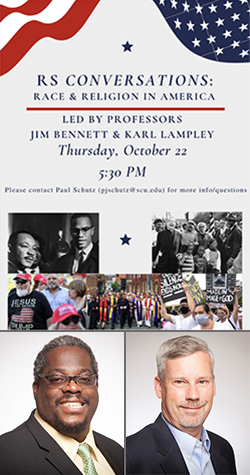RS Conversations: Race & Religion in America

Paul Schutz reports that on Thursday, October 22nd, 2020, twenty members of the SCU community—including faculty, staff, and students—gathered for "Race & Religion in America," the first RS Conversations event of the academic year. Led by Professors Karl Lampley and Jim Bennett, the discussion covered the meaning and significance of race as a social construct and the historical relationships of race and religion in the United States. In his introduction, Lampley defined race as a socially-constructed classification system that emerged at the time of the colonization of the Americas. He noted, however, that naming race a social construct does not mean that it doesn't matter. Rather, we must attend to the real-life impacts racialization has—impacts that include the unequal distribution of power and social capital among white and BIPOC persons and communities. Lampley then drew a parallel between race and religion, noting how both assign identities and divide people accordingly.
Building on Lampley's points, Bennett noted that during the colonial era, religion gave moral meaning to the "otherness" generated by racialization. Applying this insight to the US context, Bennett explained how the "white Christian" became a normative status marker in American history, marking others as outsiders. He cited concrete examples of this development, including SCU's situation on "Mission" lands that were taken from the Ohlone people, the distinction between "white, Christian, and free" and "non-white, non-Christian, and non-free" during chattel slavery, the "Christian academy movement" that effectively maintained segregation after the integration of public schools, and the image of the "white Jesus."
In the discussion that followed, participants discussed race and lived religion, the myth of a post-racial society, and how white privilege functions in the present day. At the conclusion of the session, moderator Paul Schutz invited the discussion leaders to suggest one concrete step people might take to address the troubled history of race and religion in America. Bennett encouraged everyone—and especially white people—to work to understand what whiteness is, how it functions, and what benefits and privileges it entails for white people and communities. Lampley encouraged participants to use their college years to get outside their comfort zones, cross the barriers of race, and build relationships with people of different races, ethnicities, religions, cultures—to seek to build communities of inclusivity in hopes of fostering a more just and equitable world.